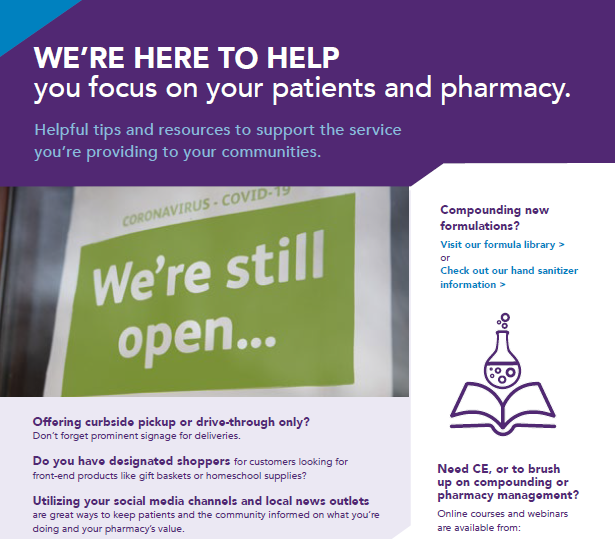Ivermectin and COVID-19
The search for an effective treatment of the COVID-19 virus cast a broad net of existing drug therapies as well as new substances. One drug to show up as a potential therapeutic agent for coronavirus is the anti-parasitic drug ivermectin.
A peer-reviewed study from Australia has been submitted and accepted for publication and should be available for wider review soon. According to researcher and co-author David Jans, PhD University of Melbourne this drug “…showed that a single dose of ivermectin could kill COVID-19 in a petri dish within 48 hours, indicating potent antiviral activity.”
The FDA-approved Drug Ivermectin inhibits the replication of SARS-CoV-2 in vitro.
Antiviral Res. 2020 Apr 3:104787. doi: 10.1016/j.antiviral.2020.104787.
Caly L1, Druce JD1, Catton MG1, Jans DA2, Wagstaff KM3.
It can be a long journey from the in vitro testing that was done in this study to final determination of efficacy of this or any drug in humans.
A search of the PubMed website provides additional studies that indicate ivermectin has potential use in a variety of viral diseases. The search term “ivermectin AND antiviral” pulls 27 abstracts. Further filtering to just those that are about humans reduces the number of published papers to fourteen.
Interest in the anti-malarial drug hydroxychloroquine as a possible treatment for COVID-19 leads one to consider whether ivermectin has been studied as an anti-malarial. In fact, a search of PubMed filtering for “ivermectin AND malaria” with additional filters of clinical trials in humans yields eight papers published between 2010 and 2018.
The focus of these studies, however, was using humans already infected with malaria to deliver ivermectin to mosquito vectors and ultimately kill the mosquitos. Ivermectin kills the mosquitos, and humans are the drug delivery reservoir. Since there is little evidence that the coronavirus is transmitted via infected mosquito bite, these studies only show that ivermectin is safe to administer as a short-term insecticide via malaria-infected human hosts.
Currently, there is an FDA approved version of ivermectin (Stromectol) for oral treatment of parasitic infections such as strongyloidiasis of the intestinal tract and onchocerciasis. Additionally, there are off-label uses noted for head lice, blepharitis, filariasis, and scabies.
Prescribers and patients must carefully weigh off-label use of any drug. A major challenge we face today is that we are taught to practice “evidence-based medicine,” but what do we do when there is little or no evidence?
As clinicians, pharmacists must always remember first do no harm. It is imperative that we weigh known safety profiles of drugs, review literature for direct supporting evidence and if not available, then indirect supporting evidence for any therapy under consideration.
Pharmacists are key members of the health care triad that includes the prescriber and patient. We must do everything we can to ensure that prescribers and patients are educated to potential benefits and risks of a therapy that has little or no evidence that it will work.
Given how serious some coronavirus infections can become it is reasonable to consider a wide range of drugs, but the ones with the least evidence need the greatest due diligence.
IMPORTANT NOTE: All Letco ivermectin products are for veterinary use only and not intended for human use.
The FDA issued a letter on April 10, 2020, “Do Not Use Ivermectin Intended for Animals as Treatment for COVID-19 in Humans.” You can read the letter here >
Latest Articles
-
Posted: April 21, 2020Categories: Industry NewsRead more »
Covid-19 has led to a constantly changing regulatory environment to support patient care. But pharmacists need to take care to monitor national as well as state laws and guidelines.
-
Posted: April 17, 2020Categories: Compounding EducationRead more »
Download our one-page flyer with tips and resources to help support the service your pharmacy and staff are providing to your communities.
-
Posted: July 08, 2020Categories: Industry NewsRead more »
The Alliance for Pharmacy Compounding held their Advocacy Town Hall, which you can watch in its entirety...
-
Posted: June 25, 2020Categories: Industry NewsRead more »
A recent clinical trial from the UK showed decreased mortality for patients seriously ill with COVID-19 requiring oxygen or ventilators when treatment included the corticosteroid dexamethasone...
-
Posted: June 05, 2020Categories: Industry NewsRead more »
This week, two major medical journals retracted separate studies on Covid-19 treatments due to an inability to validate the data and methodology used in the studies.
-
Posted: May 29, 2020Categories: Compounding EducationRead more »
The Institute for Safe Medication Practices (ISMP) recently shared a medication error involving remdesivir vial labels that provides an important example for compounders...
-
Posted: May 14, 2020Categories: Compounding EducationRead more »
Change control SOPs are critical in sterile compounding - and pharmacy technicians are not the only ones who need to understand machines and tools in the lab and workflows.
-
Posted: May 11, 2020Categories: Compounding EducationRead more »
Formulations require different sample amounts to allow for an accurate result representative of the compounded preparation.
-
Posted: April 21, 2020Categories: Industry NewsRead more »
Covid-19 has led to a constantly changing regulatory environment to support patient care. But pharmacists need to take care to monitor national as well as state laws and guidelines.
-
Posted: April 17, 2020Categories: Compounding EducationRead more »
Download our one-page flyer with tips and resources to help support the service your pharmacy and staff are providing to your communities.
-
Posted: July 08, 2020Categories: Industry NewsRead more »
The Alliance for Pharmacy Compounding held their Advocacy Town Hall, which you can watch in its entirety...
-
Posted: June 25, 2020Categories: Industry NewsRead more »
A recent clinical trial from the UK showed decreased mortality for patients seriously ill with COVID-19 requiring oxygen or ventilators when treatment included the corticosteroid dexamethasone...
-
Posted: June 05, 2020Categories: Industry NewsRead more »
This week, two major medical journals retracted separate studies on Covid-19 treatments due to an inability to validate the data and methodology used in the studies.
-
Posted: May 29, 2020Categories: Compounding EducationRead more »
The Institute for Safe Medication Practices (ISMP) recently shared a medication error involving remdesivir vial labels that provides an important example for compounders...
-
Posted: May 14, 2020Categories: Compounding EducationRead more »
Change control SOPs are critical in sterile compounding - and pharmacy technicians are not the only ones who need to understand machines and tools in the lab and workflows.
-
Posted: May 11, 2020Categories: Compounding EducationRead more »
Formulations require different sample amounts to allow for an accurate result representative of the compounded preparation.
-
Posted: April 21, 2020Categories: Industry NewsRead more »
Covid-19 has led to a constantly changing regulatory environment to support patient care. But pharmacists need to take care to monitor national as well as state laws and guidelines.
-
Posted: April 17, 2020Categories: Compounding EducationRead more »
Download our one-page flyer with tips and resources to help support the service your pharmacy and staff are providing to your communities.









